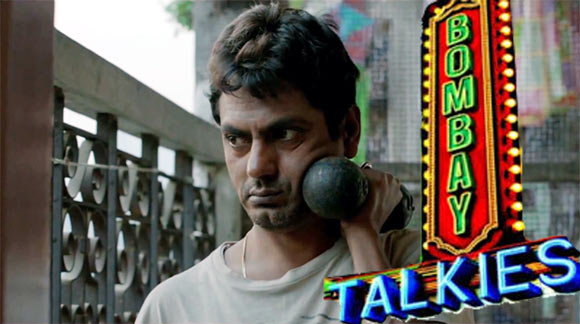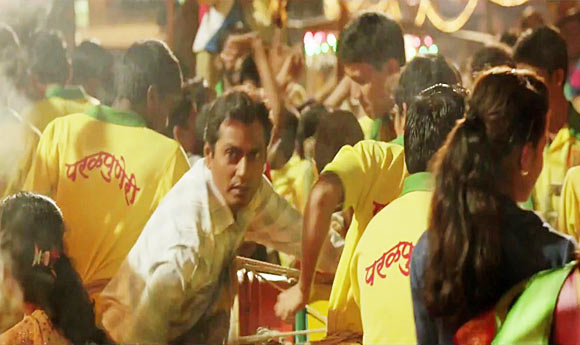
One of the four stories in this week's release Bombay Talkies is directed by Dibaker Banerjee. The other three are directed by Karan Johar, Anurag Kashyap and Zoya Akhtar.
Banerjee's story is about a failed man played by Nawazuddin Siddiqui, who has one last chance to prove to the world -- and most importantly, to his daughter -- that he is worth something.
Director of such well received films as Khosla Ka Ghosla (2006) Oye Lucky! Lucky Oye! (2008), Love Sex Aur Dhokha (2010), and Shanghai (2012), Dibaker talks to Patcy N about why he chose to be part of the Bombay Talkies project and his emotional attachment to the film.
What made you agree to direct a film that had three other directors?
Just because there were three other directors who were also going to direct -- that was unique.
I have never been given this privilege. I have always had to somehow scrounge around for myself.
So when someone comes and says Anurag, Zoya and Karan are directing a film and would you be like to be part of it, I am thrilled. It's like somebody saying that there is a super select club, and entry is by invitation only and we are inviting you. I would go there na? I felt as if I have achieved something.
Were you given a choice of which story to direct?
Everybody was given a choice. There were around six or seven stories from which we had to choose four. Everybody had to choose their own story. I chose a story written by Satyajit Ray.
Why did you choose that story?
I had read it when I was 12-13 years old and I was obsessed by the story. Suddenly, when I read it now, it clicked in my mind that I can adapt it and change it a bit to become a wonderful film for Bombay Talkies.
It is about cinema and yet it is not about cinema, it's about our lives.

What is the story about?
It is about a common man, a failed actor, a failed man, and its about his last chance to succeed
In fact he is not an actor. He thinks he is an actor like how we all think we are heroes. In our mind, we are heroes of our own stories.
Why did you choose Nawazuddin Siddiqui for this role?
He is the best actor we have and I have wanted to work with him since Black Friday but it never worked out.
I told Nawaz that it is a small film, just six or seven days shoot and you play the main guy and you have to speak Marathi, are you on? He said 'I am on for anything with you'.
Since you are from Delhi and he is from North India too, how did you manage in Marathi?
I have lived in Parel (in central Mumbai), for the last eight years. I can understand Marathi very well. My office is in Lal Baug (in central Mumbai). The film is shot in a chawl in Lal Baug.
Many of the other actors in the film are Marathi-speaking. We used non-actors from that chawl. I understand this region and its ethos as well as many Marathis do so I don't think I was handicapped at all.
Nawaz did a workshop for two-three weeks with Sadashiv Amrapurkar. He went and lived in that chawl for three or four days. Nawaz shadowed and followed the man who we thought was a typical stereotype for him to adapt himself to.
How long is your story in the movie?
Twenty-seven minutes. In fact, all the stories are around 25 to 30 minutes.

Have you seen the stories made by the other three directors? Which is your favourite -- other than yours, of course?
Yes, I have seen the whole film. I liked all the stories because I didn't compare. All the stories are ours, my film is as much Zoya's as Zoya's film is mine, we are looking at the film in totality. This is not the place where we are trying to compete with each other.
All of us are surprised by Karan's (Johar) film and how he has managed to break completely from his style of work so far. How he has completely moved in a new direction.
I think a new direction has opened up for Karan and for his film; Indian cinema will be richer because of this Bombay Talkies project.
Did you go on each other's sets, and did you discuss the movie with each other?
No, we thought it was best not to discuss the movie. We spoke to each other about many other things but we knew the more we stayed ourselves, the richer and full of variety the project will become.
There were some discussions so we knew the others were on the right track. We intentionally did our own thing and later combined it to see what happens.
Before we started making the film we discussed the ethos of the film and I think that is where our common ground is and you can see that in the film.

What does it mean when you say you are trying to capture the emotion of cinema?
For me, this film has been a very emotional journey because it is about cinema. It is based on Satyajit Ray's story, and it is a childhood memory.
It is also about the daughter and father relationship and I couldn't have made the film without being a father, which I have been for the last three-and-a-half years. It's completely new to me.
It is about the man's heroism to his child. A man may be a total failure for the world but when he enters the house his child wants him to be a hero.
When I was a child I wanted my father to be my hero. My father may have taken thousands of knocks all over the world and come back home tired and defeated, but to me he was god, he was my hero.
It is about failure and success. To your child, you are always a hero. You need to succeed with your child -- that is one zone of success that you should never give away. That is a new emotion for me also. This film is not hiding any emotion, it is playing every emotion.
I have composed music for the first time in this film I have been hugely involved with music in all my films and I have composed at least one track in all my films. But Bombay Talkies had just one piece of music in the whole film and that music is composed by me. It is based on a Tagore song. It's an emotional piece of music.
All this taken together makes this the most emotional film for me.
